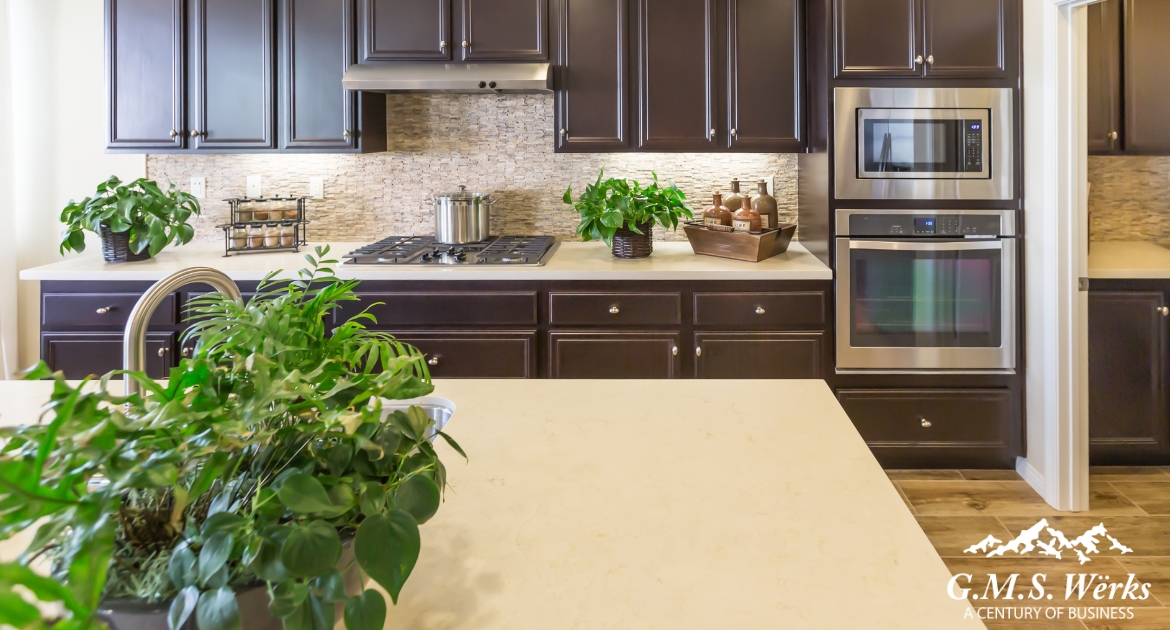-
4225 Florence Blvd
-
Appointments Recommended
Mon - Fri: 8:00am - 4:00pm
-
Schedule Your Appointment:
(402) 451-3400 - Request Quote
Mon - Fri: 8:00am - 4:00pm

When it comes to natural stone countertops, many may think of granite, marble or quartzite as their first options. While these are all top-of-the-line materials that many use throughout their kitchen and bathroom designs, there are other natural stone options that work just as great as a countertop material; including travertine!
Travertine countertops are a popular choice for homeowners looking to add texture and enhance their bathroom design. However, the bathroom is far from the only space in which you can incorporate travertine! Travertine is a great option for kitchen countertops, outdoor countertops, backsplashes and fireplace surrounds.
At GMS Werks, we are your go-to travertine countertops company in Omaha! Our team can help you select and install quality natural stone countertops of all kinds. Below, we go over what travertine countertops are and the pros and cons they offer!
Travertine is a type of limestone that is formed around mineral springs and geysers. Marble and travertine stones often get confused because of their similarities in color and marbling effects. While these two stones are similar they’re not formed in the same place, which gives them a slight variation in their color and marbling effects.
Travertine is a common stone used in bathrooms, shower tiles, pools and outside kitchen areas. Here are some of the major pros and cons of incorporating travertine tile into your home!
Travertine is cheaper than marble and granite. Oftentimes, if homeowners and businesses are on a tight budget but want the elegance of natural stone in their design, travertine is a great option!
When it comes to choosing a color, travertine offers many options! With warmer hues and softer textures, travertine can fit into any existing design tremendously, helping enhance the aesthetic appeal of kitchens and bathrooms alike.
As if these pros aren’t wonderful enough already, travertine is extremely durable. How do we know this? The coliseums throughout Italy were designed and built with travertine! If these coliseums are still standing today, then travertine in a home or office should last for the lifetime of the space. On the rare chance that tiles start to break, travertine is easily replaceable!
While there are many advantages, there are also cons you should know to make an informed decision.
While travertine is a durable and long-lasting choice that is usually cheaper than other natural stones, it often takes more maintenance than other natural stones on the market. Travertine, by nature, is a very porous stone, which means that liquid can easily get into these pores. Because of this, sealant needs to be periodically added to travertine countertops to keep liquid from getting into the stone’s pores.
Natural stone can be extremely heavy, and travertine is no exception to this. Because travertine is such a heavy material, it may have a more extensive and difficult installation process. An engineer needs to ensure the floors or cabinets can withstand the weight of the stone. However, this is true of all natural stone countertop materials, including granite and marble.
When it comes to adding natural stone countertops to your home, granite, marble and quartzite are great choices. However, if you are looking for a cheaper natural stone alternative, travertine is another excellent choice!
At GMS Wërks, we are your travertine countertop experts! Give us a call with any questions you may have regarding your next home renovation project!